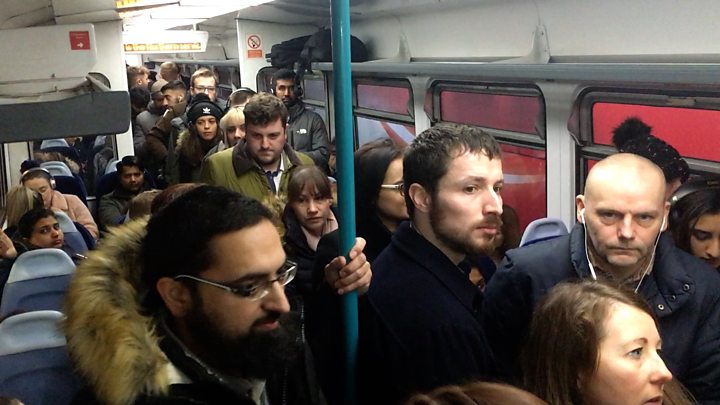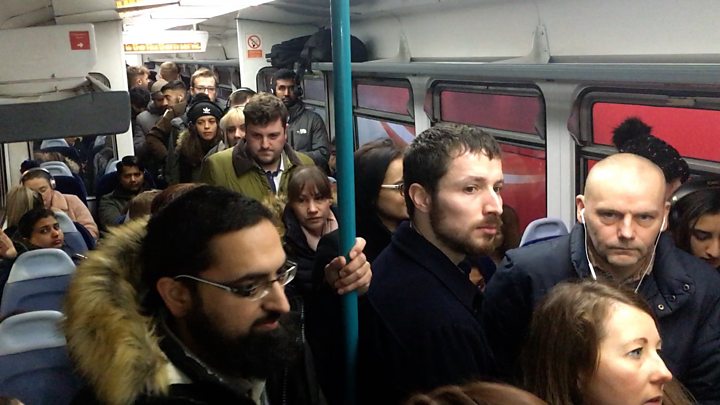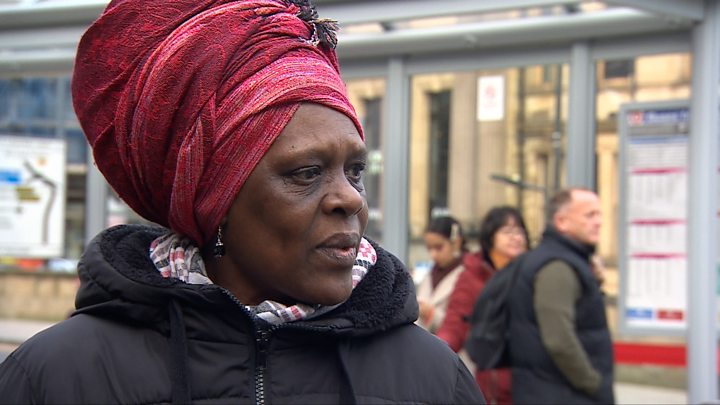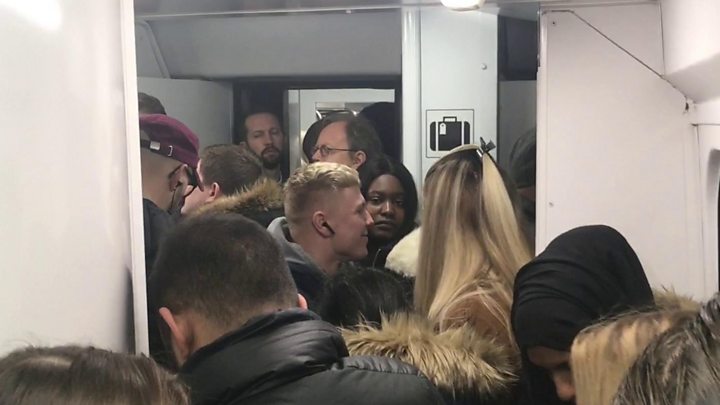Northern: Rail firm brought under government control
The government is to take control of the troubled train operator after two years of passenger chaos. …


Media playback is unsupported on your device
Troubled rail company Northern is to be brought under government control.
The decision, which will see the firm’s franchise stripped from operator Arriva Rail North from 1 March, was taken following years of major disruption.
Transport Secretary Grant Shapps said passengers had “lost trust in the north’s rail network”.
Arriva said it “understood the government’s decision”, but problems had been largely due to “external factors” such as rail infrastructure.
Northern passengers have faced rail chaos ever since new timetables were introduced in May 2018, and punctuality and reliability problems have continued to blight the network.

Media playback is unsupported on your device
Mr Shapps said: “People across the north deserve better, their communities deserve better and I am determined to achieve that.”
The move means services will be operated by an arms-length government-owned company.
German-based Arriva had been due to run Northern until March 2025.
But Mr Shapps revealed in October he had requested a proposal from Northern to outline its plans to improve services, after “unacceptable” delays and cancellations.
The Department for Transport then had to consider whether to hand a new, short-term contract to Arriva, or to nationalise services by putting the government-controlled Operator of Last Resort (OLR) in charge.
What went wrong at Northern?
The company has faced a range of problems in recent years, including widespread cancellations and delays following the introduction of new timetables.
It also faced challenges due to infrastructure projects, strike action and an ageing fleet of trains. Its continued poor performance earned it the nickname ‘Northern Fail’ from frustrated passengers.
Recent figures from Office of Rail and Road revealed how just 56% of Northern trains arrived at stations within a minute of the stated time on the timetable in the 12 months to 7 December.
That compares to an average across Britain of 65%.
What else is to blame?
Northern said external factors had made the company’s plan for the network “undeliverable”.
These included prolonged industrial action by the RMT, and delayed and cancelled infrastructure projects.
More than half of delays on the entire UK rail network were down to problems with the infrastructure, like signalling.
Government-owned firm Network Rail was put on a warning earlier this month for its poor service on routes in the North West and Midlands.

Media playback is unsupported on your device
Who will take over?
Northern services will transfer from Arriva Rail North to Northern Trains Limited, a newly formed subsidiary of the Department for Transport’s OLR.
OLR is a public company, staffed by experienced train managers, which reports directly to the government.
It already manages the London North Eastern Railway (LNER) franchise after rail services on the East Coast Main Line were brought back under government control in May 2018 .
However, this was only supposed to last for two years.
What do passengers think?
For many people who have faced repeated delays travelling on Northern trains, the news has been welcomed.
“Good riddance,” said Sam Barnes, 56, from Todmorden, West Yorkshire.
“My brother-in-law is a train driver on London routes and when he finishes his shift it takes him ages to get home on Northern as they are always delayed.”
Read more on how Northern passengers have reacted.
What the government says
Mr Shapps described the move as “a new beginning for Northern” but he sounded a note of caution for those expecting immediate dramatic improvements.
“Northern’s network is huge and complex, some of the things which are wrong are not going to be quick or easy to put right,” he said.
The much-maligned Pacer trains must still be replaced and Mr Shapps said new technology would be rolled out to identify overcrowding issues.
He also revealed plans to extend platforms at 30 stations on the Northern network to allow for longer trains.
The new government-owned company will be asked to prepare a plan in the first 100 days “to make sure we leave no stone unturned in improving this franchise for passengers”.
This is an uncomfortable moment for the government. In the end, nationalising this vast commuter network was its only option.
An agreement to change Arriva’s contract and keep the firm on board wasn’t possible because a commercially, and politically, palatable deal couldn’t be found.
What the government wants on Northern is a new performance-related train contract, like existing ones for Merseyrail and the London Overground, which put less risk on the train company.
As one rail boss described it, this type of system will be very similar to a nationalised railway, but private companies will still have a role to play.
Northern’s failure is in large part down to ancient infrastructure which struggles to cope with the high volume of trains and passengers at peak times.
Put simply, there is no silver bullet for improving our railways.
What’s been the reaction?
Greater Manchester mayor Andy Burnham and his Liverpool City Region counterpart Steve Rotheram described the news as a “victory” for passengers.
In a joint statement, they called on the government to “commit to investing in much-needed rail infrastructure and work with leaders across the north to deliver the vision and funding needed to build the modern transport network that the people of our region deserve”.
Manuel Cortes, general secretary of the TSSA transport union, welcomed the decision but said the government must understand “franchising of our railways, while stuffing the mouths of shareholders with gold, has completely failed”.
Mick Whelan, general secretary of train drivers’ union ASLEF, also warned “there won’t be an immediate improvement”.
“[This is] because many of the systemic failures at Northern – the late delivery of new rolling stock, the cancellation by the Conservative government of infrastructure upgrades, trying to run a service with too few drivers – cannot be remedied overnight,” he said.
How has Northern responded?
Chris Burchell, Arriva’s UK managing director, said he recognised “overall service improvements have not come quickly enough”.
“For that, we wholeheartedly apologise,” he said.
He also thanked staff for working “tirelessly over the last four years”.
“I am confident that as a result of the determination and hard work of the Northern rail team, they have helped set strong foundations for future improvement on the network.”
What next for passengers?
While the name of the operator will change on 1 March, branding on the trains will remain the same and staff will keep their jobs.
Over the next few weeks, services will continue to run and customers should continue to buy tickets in the usual way, Northern Trains Limited said.
Tickets purchased for journeys using multiple train companies will still be valid, a spokesperson added.
Further announcements will be made when the transfer is complete on 1 March.
If you have a question about Northern, the service or the franchise let us know by completing the form below.
In some cases your question will be published, displaying your name, age and location as you provide it, unless you state otherwise. Your contact details will never be published. Please ensure you have read the terms and conditions.
If you are reading this page on the BBC News app, you will need to visit the mobile version of the BBC website to submit your question on this topic.



